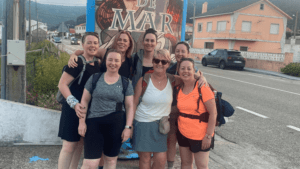Breaking Barriers and Encouraging Participation for Women in Sports
In sports, Ireland can proudly boast an impressive lineup of outstanding female athletes who have made their mark on the international stage. These women have paved the way for future generations, from the remarkable Sonia O’Sullivan to the dynamic Katie Taylor, Rachael Blackmore, Ellen Kean, and Annalise Murphy.
Despite these successes, there are concerning trends that indicate girls drop out of sports at an alarming rate, while barriers to exercise persist for older women. We at Finesse do everything we can to inspire collective action to support and empower girls and women in sports and exercise.
Recent studies have revealed several key factors contributing to the high drop-out rate of girls in sports around 13 years old. One significant reason is the need for more positive role models and a scarcity of female coaches, making it challenging for girls to find relatable mentors within their sporting communities. On this note, the 2023 team led by Vera Pauw is inspiring! Additionally, societal pressures, body image concerns, and competing interests are barriers that discourage girls from continuing their athletic pursuits.
Moving beyond adolescence, it becomes evident that older women face distinct challenges regarding exercise participation. Research has unveiled a not-so-surprising barrier: pelvic pain, urinary incontinence, and pelvic organ prolapse (POP) account for many women who are too self-conscious and embarrassed to undertake an exercise routine. These issues, often experienced by women after childbirth, menopause, or due to other underlying reasons, can significantly impact a woman’s confidence and comfort during physical activity. As a result, many women avoid exercise altogether, missing out on the numerous health benefits of an active lifestyle.
We all know exercise is essential for our health, but we might not know that heart disease is Ireland’s number one killer of women. It is vital to have conversations about health management, including addressing subjects such as menstrual cycles and the impact of hormones, to encourage regular exercise. Establishing open lines of communication with young girls, clubs, coaches, and families can foster an environment where women feel supported in pursuing their sporting aspirations while prioritising their health.
Coaches and fitness professionals have a crucial role in supporting and nurturing the participation of older women in exercise. By familiarising themselves with the barriers mentioned above, they can create inclusive environments catering to women’s needs. Providing facilities that accommodate pelvic health concerns, offering educational resources, and encouraging open dialogue around women’s health issues are essential steps to dismantle barriers and promote long-term engagement.
As the Irish Women’s Soccer team prepares for their inaugural World Cup appearance, we witness the inspiring impact that women in sports can have on future generations. This momentous occasion presents a perfect opportunity to reflect on the girls and women who may benefit from conversations about sports and exercise, breaking down barriers and encouraging their involvement.
It is time to turn the tide and create a society that supports, empowers, and embraces girls and women in sports and exercise. By addressing the drop-out rate among girls, understanding barriers faced by older women related to pelvic health, tackling heart disease as a significant concern, and fostering awareness among coaches and fitness professionals, we can create an inclusive environment encouraging all women to engage in physical activity. Let us rally together, inspired by the achievements of remarkable Irish female athletes, to pave the way for a future where every girl and woman feels comfortable, confident, and empowered in pursuing their sporting dreams.
If any of the issues raised in this post have sparked your curiosity, please get in touch with us. If we can help, we will; if we can’t, we’ll know who to point you towards.


